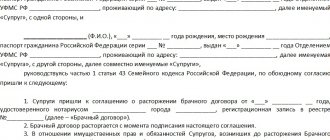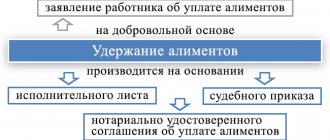What is alimony - the concept of alimony obligations and measures to ensure them
Alimony is material means of maintenance that are required by law to be provided by one person to another due to the family relationship existing between them.
Translated from Latin , alimony is food, feed. In modern legal dictionaries, alimony can be understood as funds issued for the maintenance of separately living disabled members of a current or former family.
In other words, this is the so-called material maintenance or support.
In the Family Code of the Russian Federation
The term "alimony" is used as "help", "a fixed sum of money" or "maintenance". In accordance with Article 80 of the RF IC, the most correct definition of alimony is “maintenance”.
Alimony obligations may arise between citizens who have kinship, marriage or family relationships provided for by law. As a rule, obligations relate to the material side of the issue.
In order for Russians to fulfill their alimony obligations and to comply with the procedure for calculating and collecting alimony, Russia has legal and procedural documents according to which various services and departments of this structure operate.
To ensure the fulfillment of alimony obligations in Russia, the following measures are provided:
- Regulatory and procedural documentation is being developed that regulates the purpose, procedure and methods of collecting alimony.
- There are official bodies and structures involved in the collection, calculation and payment of alimony.
- There is a voluntary and compulsory procedure for collecting alimony funds.
- Measures are taken to force the debtor to pay alimony.
- A search is being carried out for the debtor and his property.
- There are several types of legal liability that arise in connection with non-payment of alimony payments or evasion of alimony obligations.
These are the main measures that are provided in Russia to ensure that alimony obligations are carried out by citizens in full - and in accordance with the letter of the law.
What types of alimony are there?
Sometimes a situation arises when a person, due to objective reasons, cannot work.
He is considered to be in need of outside financial support. Domestic legislation provides for a social protection procedure for such cases. Categories of citizens in need may include:
- minor children,
- pregnant women,
- disabled people,
- disabled persons.
If such people have close relatives, then many of them have a legal obligation to provide financial support to their family members in need. And sometimes - former family members.
The term is borrowed from Latin. "Alimentum" is translated as "dependency"/"maintenance".
The types of alimony obligations are prescribed in Section 5 of the RF IC. The section determines who and for whose benefit should bear certain financial (material) responsibilities. And also how, if there is no independent fulfillment of the duties assigned by law, a person can be forced to perform the necessary actions.
Download for viewing and printing:
Family Code of the Russian Federation
The concept of alimony in the Russian Federation follows from the general meaning and content of the articles of the RF IC. There is no clearly defined term in the law. It is available only in the internal departmental acts of the FSSP. According to which, alimony in Russia is understood as material support (money) provided for children under 18 years of age or adult but disabled members of their family.
This formulation of alimony is incomplete. Since the RF IC lists the circumstances when alimony payments are assigned in favor of former family members.
Types of alimony in Russia and conditions for their assignment - a useful table
Alimony is divided into groups according to the same parameters.
Let's list the different types of alimony:
- By content recipients.
- For payers of alimony payments.
- According to the procedure for assigning alimony.
- By the number of children born.
- According to the age category of the child who is entitled to child support.
- According to the social status of payers and recipients.
- According to the method of calculating alimony payments.
Each species has its own subspecies. Let's take a closer look at each type in the table, its characteristic features - and explain when alimony can be calculated, how, and who can act as alimony payers.
| Types of alimony obligations in Russia | ||
| № | Name of the type of alimony | Comments |
| 1. Alimony by recipient of funds | ||
| 1.1 | Minor children | Alimony is accrued to minor children from the moment of birth until the age of 18. |
| 1.2 | Adult disabled children | Child support can be prescribed if the child has a disability of group 1 or 2, or a disability has been registered since childhood. |
| 1.3 | Disabled parents | Cases where parents neglected to fulfill their responsibilities towards their children are excluded. |
| 1.4 | Spouse | The ex-wife can also receive it. Child support is prescribed during pregnancy or until the expiration of 3 years from the date of birth of the child. |
| 1.5 | Spouse | A needy, disabled person, including a former spouse, who is caring for a common disabled minor child or an adult disabled child of group 1, can count on it. |
| 1.6 | Minor or adult disabled or needy relatives | Brothers, sisters, grandmothers, grandfathers, grandchildren, teachers, stepfathers, stepmothers can receive alimony, provided that it is impossible to assign alimony in their favor from children, parents, spouses and ex-spouses. |
| 2. Alimony for payers of funds | ||
| 2.1 | Parents | Both the mother and father of the child, as well as guardians who have equal rights to natural parents, can act as payers. By the way, if parents are deprived of parental rights, child support obligations can still be assigned. |
| 2.2 | Adult able-bodied children | The exception is for children if: — Their parents were deprived of parental rights. — There is other evidence of parents avoiding raising their children and participating in their lives. |
| 2.3 | Spouses, including ex-spouses | Alimony obligations may arise between spouses in the following cases: - If your spouse is pregnant. — If a spouse, even an ex-wife, has a child, then the spouse will pay alimony until his third birthday. - If the spouse needs funds for the maintenance and care of a disabled child or a disabled child of adult age who has groups 1 and 2. - If the spouse became disabled and in need within 1 year before the divorce. - If the former spouse reached retirement age no later than 5 years from the date of dissolution of the “long” marriage. |
| 2.4 | Other minors and adult relatives in need | Brothers, sisters, grandmothers, grandfathers, grandchildren, teachers, stepfathers, stepmothers can receive alimony, provided that it is impossible to assign alimony in their favor from other relatives. |
| 3. Alimony according to the procedure for assigning alimony | ||
| 3.1 | Voluntary order or registration of an agreement on the payment of alimony | Alimony can be collected from a spouse on a voluntary basis if:
Please note that in its legal force the agreement is equivalent to a writ of execution. |
| 3.2 | Compulsory procedure for assigning alimony through the courts | Alimony may be forced. The parent who has a dependent child must prepare and file a statement of claim with the court. The claim is filed in the magistrate's court at the defendant's place of residence. At the end of the hearing and the decision is made, the parent must receive a writ of execution from the court. This document must, in turn, be submitted to the FSSP in order for the bailiffs to begin work on collecting alimony payments. Not only parents for children, but also other needy relatives can forcefully demand alimony. |
| 4. Alimony based on the number of children - Article 81 of the RF IC | ||
| 4.1 | Child support for one child | 1/4 of the debtor's income is paid. |
| 4.2 | Alimony for two children | 1/3 of the payer’s income is assigned to each child. |
| 4.3 | Child support for three or more children | The debtor will have to pay the children half of his income, or in exceptional cases established by the court, in an amount of no more than 70% of the citizen’s income. |
| 5. Alimony by age category of the child | ||
| 5.1 | Child support for a child up to 1 year | - Can be accrued to both the child and his mother. The spouse may be an ex. — Alimony payments may increase if the child is disabled. |
| 5.2 | Child support for a child under 3 years old | - May be charged per child. - The mother can also provide alimony if she is on maternity leave for up to 3 years. If the mother goes to work before the child reaches the age of 3, the payment for her maintenance is canceled. |
| 5.3 | Alimony for a minor child under 18 years of age | Paid in full, except for the following cases: - If a minor is married. - If the child is recognized as fully capable. For example, he will work officially and will be able to fully support himself. — If a criminal offense was committed against the payer by a child. |
| 5.4 | Child support for an adult child and student | May be recovered if: — The child is disabled since childhood. — The child has an acquired disability of group 1 or 2. It is necessary to prove to the court the fact of incapacity for work. |
| 6. Alimony according to the social status of payers and recipients | ||
| 6.1 | Alimony from an unemployed person | The payment amount is calculated based on the cost of living applicable in the region per child. It is preferable to assign alimony in a fixed amount. |
| 6.2 | Alimony from an individual entrepreneur (IP) | The alimony payment may change in size, as it depends on the income of the entrepreneur. |
| 6.3 | Child support from a disabled parent | A disabled parent is not exempt from fulfilling child support obligations. |
| 6.4 | Alimony for a disabled child | Alimony may be assigned in an increased amount. For example, compensation may be paid for the operation. Such alimony may be awarded for the maintenance of the parent caring for the child. |
| 7. Alimony by calculation method | ||
| 7.1 | Percentage calculation method | The amount will be calculated from all income of the debtor. |
| 7.2 | A fixed amount of money | Appointed if: — The payer does not have a regular income. — Receives wages partially or fully in foreign currency. — The payer’s income is low and cannot provide full support for the child. |
| 7.3 | Collection of property or transfer of property to a minor | It represents a so-called “buyout” from payments in kind. Please note that according to the law, alimony must be spent specifically on life support, so this option for paying alimony can be challenged in court. As a rule, a property census does not exempt a citizen from paying future alimony. |
Some distinguish a group of alimony payments with or without marriage.
Remember that the conclusion or dissolution of a marriage will not affect the assignment or payment of alimony.
Cancellation of maintenance obligations
Despite the fact that the legal relations that arise are of a mandatory nature, that is, the parents have the first priority to receive a livelihood from their offspring, there may be circumstances in which these relations will not be considered legal.
A child of his parents is exempt from paying if in his family there are other persons of the first priority (his own children) in need of guardianship.
If the court finds that the parents previously shied away from their responsibilities to support their children when they were minors, the court will terminate or cancel the alimony obligations for their maintenance. Also, parents may incur civil liability for failure to pay child support if the statute of limitations for the offense has not expired.
As for incapacitated citizens, their interests must be defended in court by legal representatives.
Alimony cannot be collected from a disabled person who does not have a pension or benefits.
If adults were previously deprived of parental rights by guardianship authorities, then children are also exempt from their maintenance and are not required to enter into formal agreements on financial assistance.
Responsibility for non-payment of alimony and failure to fulfill alimony obligations
The legislation of the Russian Federation provides for the following liability for evasion or non-payment of alimony:
- Property liability.
- Family law.
- Administrative.
- Criminal.
Let's take a closer look at what punishments an alimony debtor can expect:
- Penalty.
Interest compensation, according to Article 115 of the RF IC, can be recovered for each day of delay in the amount of 0.1% of the amount of unpaid alimony. Please note that they may charge a higher percentage, which is specified in the agreement on the payment of alimony (if it was concluded between the spouses voluntarily). - Seizure of the debtor's property
. The bailiff has every right to seize the alimony provider’s property and prohibit its use until alimony is paid in full. The court can also seize the property if the payer has neither work nor income. The property is then sold at auction, and alimony is paid from the proceeds. - Seizure of a bank account.
With the appearance of debt, the payer's bank accounts may be blocked. The blocking will be lifted when the alimony pays the entire amount of the debt. - Penalties
. The fine may amount to 100 minimum wages of the debtor if it is found that he hid his income and evaded paying alimony. Also, the amount of the fine can be 20,000 rubles if the debtor cannot perform mandatory work or administrative arrest cannot be imposed on him (Part 1 of Article 5.35.1 of the Code of Administrative Offenses of the Russian Federation). - Fine for failure to comply with bailiffs' demands.
Its amount can range from 1,000 to 2,500 rubles for a citizen, and from 30 to 100,000 rubles for an official. (Article 17.14 of the Code of Administrative Offenses of the Russian Federation). - Deprivation of parental rights.
This is not a punishment, but a measure that can push the alimony provider to think about it and start paying alimony for the maintenance of their children. Unfortunately, in Russia, deprivation of paternity is not a rare occurrence. According to the laws, parents are required to support their children. If they intentionally refuse their parental responsibilities, then the court can deprive them of their rights. - Deprivation of rights to drive a vehicle
. The law has been in force in Russia since 2020. According to it, the alimony holder can be deprived of his rights if the alimony debt is more than 10,000 rubles. A bailiff can make a decision on deprivation of rights. An exception may be, for example, if the debtor is disabled, or the amount should be less than 10,000 rubles, or the citizen has another dependent child, or he supports a disabled child. - Restrictions on traveling abroad.
Debtors are prohibited from traveling outside the Russian Federation if the debt amounts to 30,000 rubles. This amount was approved at the end of 2018. Previously it was 3 times less. - Carrying out compulsory work for 150 hours
, or administrative arrest for 10-15 days (Part 1 of Article 5.35.1 of the Code of Administrative Offenses of the Russian Federation). - Carrying out correctional or forced labor
. The period for completing these works can be extended to 1 year (Part 1 of Article 157 of the Criminal Code of the Russian Federation). - Arrest.
A citizen can be arrested for 3 months (Part 1 of Article 157 of the Criminal Code of the Russian Federation). - Deprivation of liberty. They can be imprisoned for 1 year. This is indicated in Part 1 of Article 157 of the Criminal Code of the Russian Federation.
If you are a defaulter on alimony, lawyers recommend that you carefully consider this topic and start making payments.
And if you still have questions, ask our consultants on the website in the form below or share them in the comments to the article.
Types of child support
In addition to the general classification, a narrower structure of alimony penalties can also be distinguished. The types of child support are defined:
- for minors - applies to all children,
- for adults - for disabled children (disabled persons), provided that they need financial assistance.
Important! The latter type of payments can only be collected in a fixed form, taking into account the well-being of the participants in legal relations and other objective aspects.
Child support
The amount of payments depends on the number of children. For one person 25% of the salary is transferred, for two - 33%, for three or more - 50%.
If it is not possible to establish the exact income of the payer, he receives a salary in foreign currency or is unemployed, alimony is assigned in a fixed amount. Their value is determined based on the cost of living and the average salary.
A woman can demand any method of payment. When the ex-spouse is officially employed, but the fixed amount is higher than the share amount, she has the right to choose the most profitable option.
General procedure
It is possible to reach an agreement on the payment of alimony between the payer and the recipient of funds. To do this, an agreement is drawn up indicating the amounts and payment periods, which is submitted to a notary office for certification.
Transfers of funds are recorded by bank statements. It is also possible to receive money in person by drawing up receipts indicating the date and amount.
If an agreement drawn up voluntarily is not executed, it is transferred for execution to the Bailiff Service. In this case, going to court is not required, since the agreement has the force of an executive document.
When there is no agreement, you need to collect all the information and go to court to resolve the issue. Based on the result, a court order is issued if the amount of claims is less than 50 thousand rubles, or a writ of execution based on a court decision, which must be presented to the regional branch of the FSSP of the Russian Federation.
The absence of a permanent place of employment is not a reason for exemption from paying alimony; its amount is calculated based on the amount of minimum material support in the region - subsistence level.








